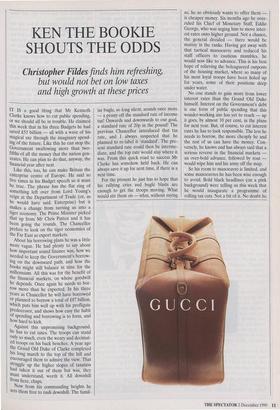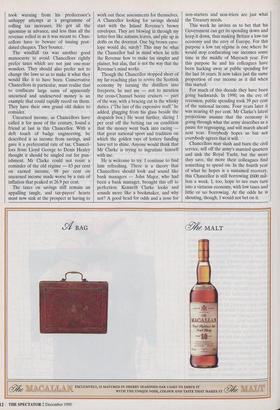KEN THE BOOKIE SHOUTS THE ODDS
Christopher Fildes finds him refreshing,
but would not bet on low taxes and high growth at these prices
IT IS a good thing that Mr Kenneth Clarke knows how to cut public spending, or we should all be in trouble. He claimed this week that in his three Budgets he had saved £53 billion — all with a wave of his magical axe through the imaginary spend- ing of the future. Like this he can stop the Government swallowing more than two- fifths of all the money that the nation gen- erates. He can plan to do that, anyway, the financial year after next. Like this, too, he can make Britain the enterprise centre of Europe. He said so five times in his Budget speech so it must be true. The phrase has the flat ring of something left over from Lord Young's reign at the Department of Trade (or, as he would have said, Enterprise) but it makes a change from turning us into a tiger economy. The Prime Minister picked that up from Mr Chris Patten and it has been going the rounds. The Chancellor prefers to look on the tiger economies of the Far East as export markets. About his borrowing plans he was a little more vague. He had plenty to say about how important sound finance was, how we needed to keep the Government's borrow- ing on the downward path, and how the books might still balance in time for the millennium. All this was for the benefit of the financial markets, on whose goodwill he depends. Once again he needs to bor- row more than he expected. In his three Years as Chancellor he will have borrowed or planned to borrow a total of £87 billion, which puts him well up with his profligate predecessor, and shows how easy the habit of spending and borrowing is to form, and how hard to kick.
Against this unpromising background, he has to cut taxes. The troops can stand only so much, even the weary and decimat- ed troops on his back benches. A year ago the Grand Old Duke of Clarke completed his long march to the top of the hill and encouraged them to admire the view. That struggle up the higher slopes of taxation had taken it out of them but was, they must understand, worth it. All downhill from here, chaps. Now from his commanding heights he sets them free to rush downhill. The famil- iar bugle, so long silent, sounds once more — a penny off the standard rate of income tax! Onwards and downwards to our goal, a standard rate of 20p in the pound! The previous Chancellor introduced that tax rate, and I always suspected that he planned to re-label it 'standard'. The pre- sent standard rate could then be interme- diate, and the top rate would stay where it was. From this quick road to success Mr Clarke has somehow held back. He can always save it up for next time, if there is a next time.
For the present he just has to hope that his rallying cries and bugle blasts are enough to get the troops moving. What would stir them on — what, without saying so, he so obviously wants to offer them is cheaper money. Six months ago he over- ruled his Chief of Monetary Staff, Eddie George, who was urging him to move inter- est rates onto higher ground. Not a chance, the general decided — there would be mutiny in the ranks. Having got away with that tactical manoeuvre and reduced his staff officers to cautious mumbles, he would now like to advance. This is his best hope of relieving the beleaguered outposts of the housing market, where so many of his most loyal troops have been holed up for years, some of their positions deep under water.
No one stands to gain more from lower interest rates than the Grand Old Duke himself. Interest on the Government's debt is one form of public spending that this wonder-working axe has yet to reach — up it goes, by almost 10 per cent, in the plans for next year. But, of course, to cut interest rates he has to look responsible. The less he needs to borrow, the more cheaply he and the rest of us can have the money. Con- versely, he knows and has always said that a serious reverse in the financial markets an over-bold advance, followed by rout would wipe him and his army off the map.
So his room to manoeuvre is limited, and some manoeuvres he has been wise enough to avoid. Bold black headlines (on a pink background) were telling us this week that he would inaugurate a programme of rolling tax cuts. Not a hit of it. No doubt he took warning from his predecessor's unhappy attempt at a programme of rolling tax increases. He got all the ignominy in advance, and less than all the revenue rolled in as it was meant to. Chan- cellors have to beware of issuing post- dated cheques. They bounce.
The windfall tax was another good manoeuvre to avoid. Chancellors rightly prefer taxes which are not just one-year wonders. They should also prefer not to change the laws so as to make it what they would like it to have been. Conservative Chancellors in particular, must realise that to confiscate large sums of apparently unearned and undeserved money is an example that could rapidly recoil on them. They have their own grand old dukes to consider.
Unearned income, as Chancellors have called it for most of the century, found a friend at last in this Chancellor. With a deft touch of badge engineering, he described it as income from savings, and gave it a preferential rate of tax. Chancel- lors from Lloyd George to Denis Healey thought it should be singled out for pun- ishment. Mr Clarke could not resist a reminder of the old regime — 83 per cent on earned income, 98 per cent on unearned income made worse by a rate of inflation that peaked at 26.9 per cent.
The taxes on savings still remain an appalling tangle, and tax-payers' hearts must now sink at the prospect at having to work out these assessments for themselves. A Chancellor looking for savings should start with the Inland Revenue's brown envelopes. They are blowing in through my letter-box like autumn leaves, and pile up in drifts on the doormat. One big brown enve- lope would do, surely? This may be what the Chancellor had in mind when he tells the Revenue how to make tax simpler and plainer, but alas, that is not the way that the Revenue's mind works.
Though the Chancellor stopped short of my far-reaching plan to revive the Scottish economy by turning the distillers into freeports, he met me — not to mention the cross-Channel booze cruisers — part of the way, with a bracing cut in the whisky duties. (The last of the expensive stuff,' he added, glugging from his glass beside the despatch box.) He went further, slicing 1 per cent off the betting tax on condition that the money went back into racing that great national sport and tradition on which the golden rays of lottery funding have yet to shine. Anyone would think that Mr Clarke is trying to ingratiate himself with me.
He is welcome to try. I continue to find him refreshing. There is a theory that Chancellors should look and sound like bank managers — John Major, who had been a bank manager, brought this off to perfection. Kenneth Clarke looks and sounds more like a bookmaker, and why not? A good head for odds and a nose for non-starters and non-triers are just what the Treasury needs.
This week he invites us to bet that his Government can get its spending down and keep it down, thus making Britain a low-tax economy and the envy of Europe. For this purpose a low tax regime is one where he would stop confiscating our incomes some time in the middle of Mayeach year. For this purpose he and his colleagues have been hacking away at public spending for the last 16 years. It now takes just the same proportion of our income as it did when this started.
For much of this decade they have been going backwards. In 1990, on the eve of recession, public spending took 39 per cent of the national income. Four years later it was nearing 45 per cent. Mr Clarke's latest projections assume that the economy is going through what the army describes as a pause for regrouping, and will march ahead next year. Everybody hopes so but not everybody agrees that it will.
Chancellors may slash and burn the civil service, sell off the army's married quarters and sink the Royal Yacht, but the more they save, the more their colleagues find something to spend on. In the fourth year of what he hopes is a sustained recovery, this Chancellor is still borrowing £600 mil- lion a week. I, too, hope to see ours turn into a virtuous economy, with low taxes and little or no borrowing. At the odds he is shouting, though, I would not bet on it.











































































 Previous page
Previous page